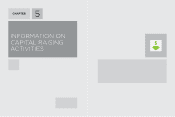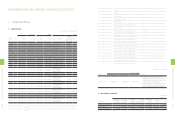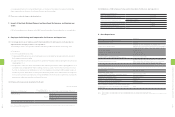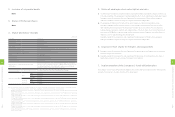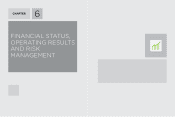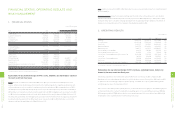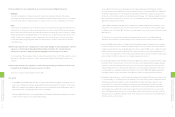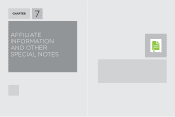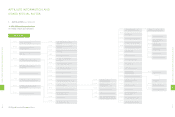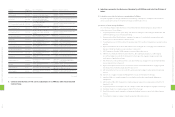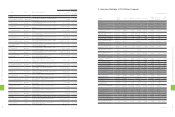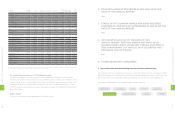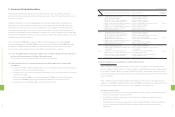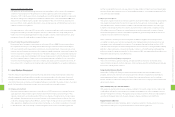HTC 2012 Annual Report Download - page 59
Download and view the complete annual report
Please find page 59 of the 2012 HTC annual report below. You can navigate through the pages in the report by either clicking on the pages listed below, or by using the keyword search tool below to find specific information within the annual report.
(9) Concentration risks associated with goods received and sold and mitigating measures
Purchases:
The skills and capabilities of materials components suppliers are maturing in step with mobile phone
technologies. Growing opportunities to source materials from multiple suppliers reduce the risk of overreliance
on one or several suppliers. HTC also purchases in volume to reduce unit costs and optimize cost structures.
Sales:
HTC products are distributed across the Americas, Europe and Asia primarily through major carriers and local
retail channels. The influence of carriers can be expected to rise in the new age of 3G/4G wireless standards,
which is expected to benefit HTC product penetration. Apart from working with current customers to expand
markets and strengthen strategic partnerships, HTC continues to discuss potential cooperative projects with
leading IT and telecom companies in order to remain at the fore of market trends. HTC is also developing
the HTC brand and strengthening relationships with channel retailers in order to reduce business and sales
concentration risks.
(10)
Eect upon and risk to the company in the event a major quantity of shares belonging to a director,
supervisor, or shareholder holding greater than a 10 percent stake in the company has been
transferred or otherwise changed hands and mitigating measures being or to be taken:
As of the printing of this annual report date, no transfer of significant portions of HTC share rights has occurred
with respect to any director, supervisor, or major shareholder holding more than a 10 percent stake in the
company.
(11) Eect upon and risk to the company associated with any change in governance personnel or top
management and mitigating measures being or to be taken:
There was no change in HTC managerial control in 2011.
(12)
Lawsuit
1. In April 2008, IPCom GMBH & CO., KG ("IPCom") filed a multi-claim lawsuit against the Company with the
District Court of Mannheim, Germany, alleging that the Company infringed IPCom's patents. In November
2008, the Company filed declaratory judgment action for non-infringement and invalidity against three of
IPCom's patents with the Washington Court, District of Columbia.
In October 2010, IPCom filed a new complaint against the Company alleging patent infringement of patent
owned by IPCom in District Court of Dusseldorf, Germany.
In June 2011, IPCom filed a new complaint against the Company alleging patent infringement of patent
owned by IPCom with the High Court in London, the United Kingdom. In September 2011, the Company filed
declaratory judgment action for non-infringement and invalidity in Milan, Italy. Legal proceedings in above-
mentioned courts in Germany and the United Kingdom are still ongoing. The Company evaluated the lawsuits
and considered the risk of patents-in-suits to be low. Also, preliminary injunction and summary judgment
against the Company are very unlikely.
In March 2012, Washington Court granted on the Company's summary judgment motion and ruled on non-
infringement of two of patents-in-suit, IPCom has filed motion for reconsideration on the two patents with
the Appeal court. In December 2012, the district court has granted a stay on case currently in the US pending
appeal decision.
As of the date of the board of directors approval and authorization for issue of consolidated financial
statements, there had been no critical hearing nor had a court decision been made, except for the above.
2. From March 2010 onwards, Apple Inc. ("Apple") and the Company filed patent infringement actions against
the other respectively in the U.S. International Trade Commission ("ITC"), U.S. District Court for the District of
Delaware, German district courts, and English High Court. On November 11, 2012, the two companies reached
a global settlement that included the dismissal of all current lawsuits and a ten-year license agreement. The
scope of this license agreement covers both the current and future patents held by the parties as agreed upon
and specifically set forth in the agreement, with royalties payable as prescribed.
3. In January 2012, Eastman Kodak ("Kodak") filed a lawsuit against the Company concurrently with the ITC and
U.S. District Court of Western District of New York ("New York court"), alleging that the Company infringed
its patents. Kodak requested ITC and the New York court to prevent the Company from exporting to and
selling in United States devices made using Kodak's patents, as well as damage compensation, respectively.
In January 2013, a U.S. bankruptcy judge presently approved the sale of 1,100 Kodak digital image patents
including the patents-in-suit to a third party. All litigation procedures involving HTC have been stayed.
4. In May 2012, Nokia Corporation ("Nokia") filed a lawsuit against the Company, HTC America, Inc. and Exedea,
Inc. ("the Company") concurrently with the ITC, Delaware court and the District Courts of Mannheim, Munich
and Dusseldorf in Germany ("German courts"), alleging that the Company infringed its patents. Nokia
requested the ITC to prevent the Company from exporting to and selling in United States devices made
using Nokia's patents and requested Delaware court and German courts to grant damage compensation.
The Company subsequently filed revocation actions against Nokia's asserted patents in the London High
Court. The Company asserts that there is no direct relation between the associated technology used in the
Company's devices and patents claimed by Nokia. The Company believes the lawsuits have limited impact on
its financial results or sales activities.
1
1
4
6
FINANCIAL STATUS, OPERATING
RESULTS AND RISK MANAGEMENT
1
1
5
6
FINANCIAL STATUS, OPERATING
RESULTS AND RISK MANAGEMENT


